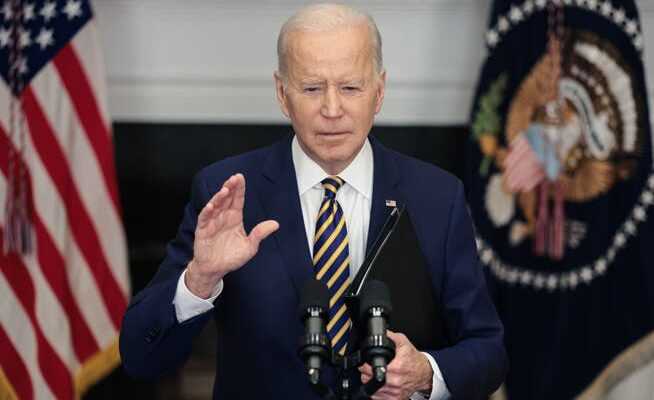The American President is stepping up economic sanctions against Russia in order to bring the country to its senses with severe measures after the attack on Ukraine. He anticipates the Europeans and has to prepare his own citizens for high petrol prices.
The measures announced by Biden are among the most far-reaching the Americans have taken against Moscow since Russia’s military invasion of Ukraine.
Shortly after 5 p.m. Eastern Time the time had come: US President Joe Biden announced an import ban on crude oil, liquefied natural gas (LNG) and coal from Russia. Washington is ahead of the Europeans, who initially only talk about it. However, they also have a harder time: They are heavily dependent on energy imports from Russia, while last year just three percent of American imports of black gold came from Russian sources. “The United States is targeting the main artery of the Russian economy,” the president said, and “we will not participate in subsidizing Putin’s war.”
anticipation of more far-reaching measures
In fact, the announced measures are among the most far-reaching that the Americans have taken against Moscow since Russia’s military invasion of Ukraine. Biden is thus pulling the political initiative back into his own hands and anticipating a number of different proposals that have recently developed a momentum of their own in Congress. Some of these would have gone even further. One of them would even have given the president extensive trade policy options – such as increasing tariffs on products from Russia and Belarus and at the same time trying to exclude Russia from the World Trade Organization (WTO). Such measures would increase the cost of Russian exports in general, and not just those of energy products.
In addition to the main goal of increasing economic pressure on the Russian aggressors in Ukraine by tightening the already severe sanctions again, Biden obviously also wants to regain control of foreign policy in Washington domestically. In this context, however, he also warns of the consequences: “Defending the principles of freedom has its price.” In this way, he prepares American citizens for high gasoline and diesel prices at the pump. In many cases, these are already at record levels, after speculation about these measures had already caused enormous uncertainty and price increases.
The war drives up energy prices
In fact, oil and gas prices on the futures markets have been through the roof since the start of the brutal war in Ukraine. While a barrel of American WTI crude oil had cost a little less than $90 a short time before, up to $130 had to be paid for it on Monday. That corresponds to an increase of 45 percent. Some strategists still expect significantly higher prices if the situation should deteriorate further. After all, in a coordinated move, Great Britain also announced that it would stop importing Russian oil at the end of the year in order to give oil importers time to develop alternative plans.
Such seem to be only just emerging in the United States. In fact, Joe Biden didn’t want to answer any further questions about his decision “until those have been clarified,” as he noted as he left. Apparently, the President debated for days whether to take the step, fearing that the already rapid rise in gasoline prices could accelerate. In fact, it’s a major domestic issue for Americans in a critical election year when most of them are auto dependent.
In order to prevent further accusations from the opposition that he is a driver of inflation, he does it again: “Russia’s aggression is costing us all dearly,” he argues and also warns against price gouging by companies that first produce petrol and diesel from the black raw material and then distribute those fuels across the country. In fact, it is not the first time that the President and the left in his Democratic Party have leveled such accusations: first they blame the high concentration of meat processing companies for the high prices in the country’s refrigerated counters, then the oil and natural gas industry for the high energy prices, and finally the grain sector could well become a target as soon as bread or breakfast muesli become more expensive.
Energy companies want to promote more
American consumers have been feeling the price hike at the pump for a while, even though the US is largely self-sufficient and imports relatively little oil directly from Russia. In California, prices for certain types of gasoline have reached levels close to $6 a gallon in various locations over the past few days, with the average price in the state on Tuesday well above $5. That’s a lot by historical standards, but perhaps Americans are still unprepared for what they’ll see on gas station labels in the future. Price expectations are threatening to spiral out of control after the inflation rate has been at its highest level in 40 years. The number for February will be published next week – it should be just under eight percent.
The executives of some of the world’s largest oil and gas producers had already declared at a conference in Houston on Monday that they would ramp up domestic crude oil production at an accelerated rate. These activities, which were already planned last year, have gained new urgency due to the current situation and the high oil price. At the same time, however, they warn against exaggerated expectations. In their eyes, it will be difficult to quickly replace the five million barrels of oil a day that until recently came from Russia to the international market.
Possibly, however, they are maneuvering in view of the fact that the American government is obviously trying to convince Saudi Arabia to increase production or even to somehow reach a political agreement with sanctioned Venezuela and encourage the country to export oil.
